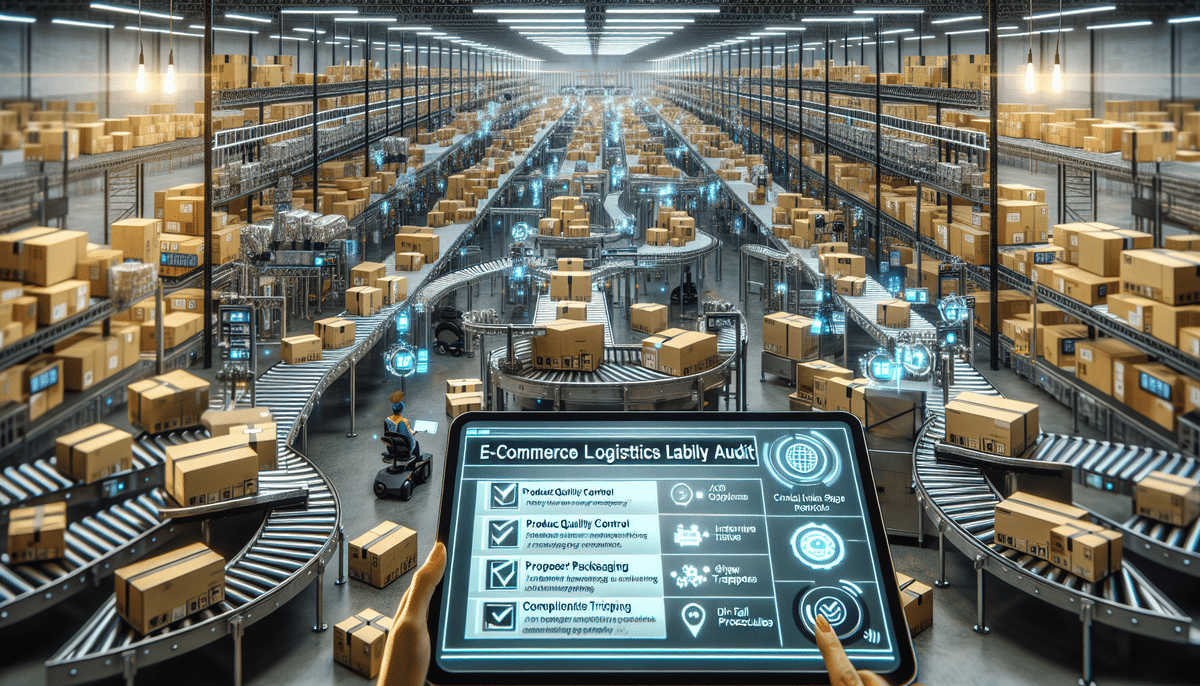Understanding E-Commerce Logistics Liability
E-commerce has rapidly surged as a preferred method for consumers to purchase goods and services online. According to Statista, global e-commerce sales reached approximately $5.7 trillion in 2022, and this number is expected to grow steadily. With the expansion of e-commerce, logistics has become a pivotal component for businesses aiming to ensure timely and secure delivery of products to customers. However, alongside these opportunities, e-commerce logistics introduces various liabilities that businesses must navigate. This article explores the different types of e-commerce logistics liability, their implications for businesses, and strategies to mitigate associated risks.
Defining E-Commerce Logistics and Its Importance
E-commerce logistics encompasses the processes involved in the movement, storage, and delivery of goods purchased online. It is a critical aspect of e-commerce, ensuring that products reach customers promptly and in optimal condition. Effective logistics management includes inventory control, order fulfillment, warehousing, transportation, and last-mile delivery.
The Challenge of Last-Mile Delivery
One of the most significant challenges in e-commerce logistics is managing last-mile delivery—the final step in the delivery process from the distribution center to the customer's doorstep. Last-mile delivery accounts for up to 53% of total shipping costs and is crucial for customer satisfaction. Efficient last-mile solutions, such as partnering with reliable delivery services or utilizing advanced routing technologies, can enhance the customer experience and foster loyalty.
Types of E-Commerce Logistics Liability
Businesses engaged in e-commerce must be aware of several types of logistics liability that can impact their operations:
- Product Liability: This involves the responsibility of businesses for any harm caused to customers due to defective or unsafe products. Ensuring product quality and safety is essential to mitigate this risk.
- Performance Liability: Businesses are liable for losses incurred by customers resulting from delayed or incorrect deliveries. Meeting delivery commitments is vital to avoid such claims.
- Third-Party Liability: This pertains to the responsibility for any harm caused to third parties due to e-commerce activities, such as incidents during transportation involving third-party carriers.
- Contractual Liability: Arises from breaches of contract with customers, such as failing to deliver products as promised or delivering products that do not meet agreed-upon specifications.
- Regulatory Liability: Involves compliance with laws and regulations related to e-commerce, including data privacy laws like GDPR and consumer protection regulations.
The Impact of E-Commerce Logistics Liability on Your Business
E-commerce logistics liability can significantly affect a business both financially and reputationally. Legal claims and lawsuits resulting from liability issues can lead to substantial financial losses and penalties. Additionally, negative customer experiences stemming from logistics failures can damage a brand's reputation, leading to reduced customer trust and loyalty.
Customer Abandonment Due to Poor Delivery Experiences
A study by Shopify indicates that 40% of customers are likely to abandon a purchase due to poor delivery experiences. Therefore, proactive management of logistics liabilities is essential to maintain financial stability and a positive brand image.
Strategies to Minimize E-Commerce Logistics Liability Risks
Businesses can implement several strategies to reduce the risks associated with e-commerce logistics liability:
- Product Testing and Quality Control: Conduct thorough testing to ensure products meet quality and safety standards, thereby minimizing product liability claims.
- Efficient Inventory Management: Utilize advanced inventory management systems to ensure accurate order fulfillment and timely deliveries, reducing performance liability risks.
- Effective Communication: Maintain clear communication channels with customers regarding order status, delivery times, and any potential delays to manage expectations effectively.
- Proper Legal Documentation: Implement comprehensive contracts, terms of service, and disclaimers to protect the business from contractual and regulatory liabilities.
- Partnering with Reputable Logistics Providers: Collaborate with reliable logistics and delivery partners to ensure consistent and secure delivery of products.
- Compliance with Regulations: Stay informed about relevant laws and regulations to ensure adherence and avoid regulatory liabilities.
Leveraging Advanced Tracking Systems
Additionally, leveraging technologies such as advanced tracking systems can enhance transparency and accountability in logistics operations, further mitigating liability risks.
Common Causes of E-Commerce Logistics Liability Claims
Several factors can lead to logistics liability claims in e-commerce:
- Inaccurate Product Descriptions: Misleading or incorrect product information can result in customers receiving products that do not meet their expectations, leading to liability claims.
- Delayed or Incorrect Delivery: Failure to deliver products on time or delivering the wrong items can cause significant customer dissatisfaction and legal claims.
- Third-Party Vendor Issues: Problems with third-party logistics providers, such as delivery delays or damaged goods, can hold the e-commerce business accountable.
- Packaging Errors: Improper packaging can lead to damaged products during transit, resulting in liability for the business.
- Regulatory Non-Compliance: Not adhering to customs regulations or data privacy laws can result in legal penalties and liability claims.
Addressing these issues through robust logistics planning and quality assurance processes is critical for minimizing liability risks.
Insurance Options for E-Commerce Logistics Liability Coverage
Obtaining insurance coverage is a prudent measure for businesses to protect against logistics liabilities. Various insurance policies can cover different aspects of e-commerce logistics liability:
- General Liability Insurance: Covers a broad range of liabilities, including product defects and third-party claims.
- Product Liability Insurance: Specifically covers claims related to product defects and safety issues.
- Professional Liability Insurance: Protects against errors and omissions in logistics and fulfillment services.
- Cyber Liability Insurance: Covers data breaches and other cyber-related incidents that can impact logistics operations.
When selecting insurance, businesses should assess the specific risks associated with their operations and choose policies that provide comprehensive coverage. Consulting with an experienced insurance agent can help tailor coverage to the business's unique needs.
Best Practices for Managing E-Commerce Logistics Liability
Implementing best practices can significantly enhance a business's ability to manage logistics liabilities effectively:
- Regular Risk Assessments: Conduct periodic evaluations to identify and address potential liability risks within logistics operations.
- Establishing Standard Operating Procedures (SOPs): Develop and enforce SOPs for all logistics processes to ensure consistency and reduce the likelihood of errors.
- Employee Training: Train staff on logistics best practices, safety protocols, and compliance requirements to minimize human error and enhance operational efficiency.
- Clear Communication with Customers: Provide transparent information regarding shipping times, tracking, and handling of any issues to build trust and reduce disputes.
- Continuous Improvement: Regularly review and refine logistics processes based on feedback and performance metrics to enhance efficiency and reduce liability risks.
Adopting these best practices can help businesses proactively manage logistics liabilities and maintain a strong, trustworthy reputation.
The Role of Technology in Reducing E-Commerce Logistics Liability
Technology plays a crucial role in minimizing logistics liabilities by enhancing efficiency, accuracy, and transparency in e-commerce operations. Key technological advancements include:
- Internet of Things (IoT): IoT devices enable real-time tracking of inventory and shipments, providing accurate data on stock levels and product conditions during transit.
- Automated Inventory Management Systems: These systems streamline inventory tracking, reduce errors, and ensure timely order fulfillment.
- Artificial Intelligence (AI) and Machine Learning: AI can optimize routing for deliveries, predict potential delays, and enhance decision-making processes in logistics management.
- Blockchain Technology: Blockchain offers secure and transparent tracking of shipments, reducing the risk of fraud and enhancing accountability.
By integrating these technologies, businesses can improve their logistics operations, reduce the likelihood of errors and delays, and ultimately lower logistics liability risks.
Legal Considerations for E-Commerce Logistics Liability
Compliance with legal requirements is fundamental for managing e-commerce logistics liability. Key legal considerations include:
- Consumer Protection Laws: Regulations such as the Consumer Product Safety Act mandate that businesses ensure the safety and accuracy of their products and services.
- Data Privacy and Security: Compliance with laws like the General Data Protection Regulation (GDPR) ensures that customer data is handled securely and responsibly.
- Shipping and Customs Regulations: Proper adherence to international shipping laws and customs requirements is essential to avoid legal penalties and shipment delays.
- Fraud Prevention: Implementing robust security measures to detect and prevent fraudulent activities can protect businesses from financial losses and reputational damage.
Businesses should stay informed about evolving legal landscapes and seek legal counsel to ensure comprehensive compliance and minimize liability risks.
Case Studies: Successful Management of E-Commerce Logistics Liability
Successful management of logistics liabilities can significantly enhance a business's reputation and customer trust. Here are some notable examples:
- Amazon: Amazon employs stringent quality control measures and offers a hassle-free return policy, minimizing product and performance liability claims. Their investment in advanced logistics technologies ensures reliable and timely deliveries.
- Zappos: Known for exceptional customer service, Zappos has built strong customer loyalty by effectively managing logistics operations and promptly addressing any delivery issues, thereby reducing liability claims.
These companies demonstrate that proactive logistics management and a commitment to customer satisfaction can effectively mitigate liability risks.
Future Trends in E-Commerce Logistics Liability
The landscape of e-commerce logistics is continually evolving, bringing new trends that can impact logistics liability:
- Increased Automation and AI: Automation and AI are transforming logistics by enhancing efficiency and accuracy, thereby reducing human errors and liability risks.
- Sustainability Initiatives: Growing emphasis on sustainable logistics practices requires businesses to adapt their operations to meet environmental standards, avoiding potential regulatory liabilities.
- Enhanced Data Privacy Measures: As data privacy becomes more critical, businesses must implement robust security measures to protect customer data and comply with regulations, mitigating legal liabilities.
- Omnichannel Fulfillment: The integration of multiple sales channels complicates logistics operations, necessitating advanced management systems to handle diverse delivery requirements and minimize liability.
Businesses should stay ahead of these trends by investing in relevant technologies, adopting sustainable practices, and continuously updating their logistics strategies to manage emerging liability risks effectively.
In conclusion, e-commerce logistics liability is a crucial aspect that businesses must address to ensure smooth operations and maintain customer trust. By understanding the different types of liabilities, implementing effective risk mitigation strategies, leveraging technology, and complying with legal requirements, businesses can protect their reputation, minimize legal and financial risks, and ensure the efficient delivery of products to their customers.






















